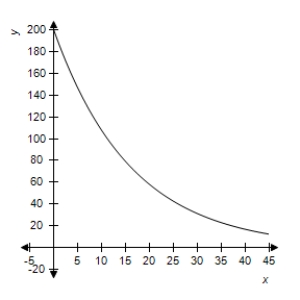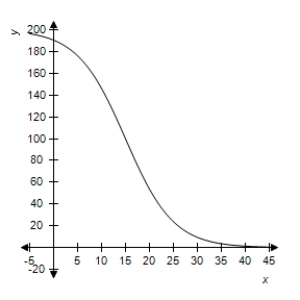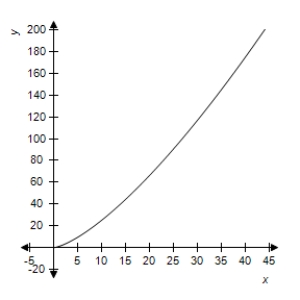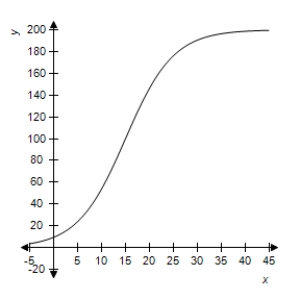Deck 21: Logistic Functions
سؤال
سؤال
سؤال
سؤال
سؤال
سؤال
سؤال
سؤال
سؤال
سؤال
سؤال
سؤال
سؤال
سؤال
سؤال
سؤال
سؤال
سؤال
سؤال
سؤال
سؤال
سؤال
سؤال
سؤال
سؤال
سؤال
سؤال
سؤال
سؤال
سؤال
سؤال
سؤال
سؤال
سؤال
سؤال

فتح الحزمة
قم بالتسجيل لفتح البطاقات في هذه المجموعة!
Unlock Deck
Unlock Deck
1/35
العب
ملء الشاشة (f)
Deck 21: Logistic Functions
1
The cumulative number F of flu cases reported after t weeks is modeled by the function  . The maximum number of people who can be expected to get the flu is (round your answer to two decimal places, if necessary)
. The maximum number of people who can be expected to get the flu is (round your answer to two decimal places, if necessary)
A) 1,398.00
B) 2,796
C) 71.69
D) 38
 . The maximum number of people who can be expected to get the flu is (round your answer to two decimal places, if necessary)
. The maximum number of people who can be expected to get the flu is (round your answer to two decimal places, if necessary)
A) 1,398.00
B) 2,796
C) 71.69
D) 38
2,796
2
The number N, in millions, of Americans with Internet access t years after 1990 is modeled by the function  .
.
According to the model, how many Americans had Internet access in 1990? Round your answer to two decimal places, if necessary.
A) 194 million
B) 97.00 million
C) 100 million
D) 1.92 million
 .
. According to the model, how many Americans had Internet access in 1990? Round your answer to two decimal places, if necessary.
A) 194 million
B) 97.00 million
C) 100 million
D) 1.92 million
1.92 million
3
The number N, in millions, of Americans with Internet access t years after 1990 is modeled by the function  . According to this model, what is the maximum number of Americans who will ever have Internet access? Round your answer to two decimal places , if necessary.
. According to this model, what is the maximum number of Americans who will ever have Internet access? Round your answer to two decimal places , if necessary.
A) 198.8 million
B) 99.40 million
C) 2.16 million
D) 91 million
 . According to this model, what is the maximum number of Americans who will ever have Internet access? Round your answer to two decimal places , if necessary.
. According to this model, what is the maximum number of Americans who will ever have Internet access? Round your answer to two decimal places , if necessary.
A) 198.8 million
B) 99.40 million
C) 2.16 million
D) 91 million
198.8 million
4
Magazine circulation after t years is modeled by the function  . The largest magazine circulation that can be expected is (round your answer to two decimal places, if necessary)
. The largest magazine circulation that can be expected is (round your answer to two decimal places, if necessary)
A) 11.00 thousand
B) 22 thousand
C) 5.50 thousand
D) 3 thousand
 . The largest magazine circulation that can be expected is (round your answer to two decimal places, if necessary)
. The largest magazine circulation that can be expected is (round your answer to two decimal places, if necessary)
A) 11.00 thousand
B) 22 thousand
C) 5.50 thousand
D) 3 thousand

فتح الحزمة
افتح القفل للوصول البطاقات البالغ عددها 35 في هذه المجموعة.
فتح الحزمة
k this deck
5
A logistic function always has a limiting value.

فتح الحزمة
افتح القفل للوصول البطاقات البالغ عددها 35 في هذه المجموعة.
فتح الحزمة
k this deck
6
For a logistic function, the function shows a maximum growth rate at half the limiting value.

فتح الحزمة
افتح القفل للوصول البطاقات البالغ عددها 35 في هذه المجموعة.
فتح الحزمة
k this deck
7
A logistic population model shows the most rapid population growth at the inflection point.

فتح الحزمة
افتح القفل للوصول البطاقات البالغ عددها 35 في هذه المجموعة.
فتح الحزمة
k this deck
8
The cumulative number F of flu cases reported after t weeks is modeled by the function  . How many people had the flu at the start of the epidemic? Round your answer to the nearest whole number.
. How many people had the flu at the start of the epidemic? Round your answer to the nearest whole number.
A)
B)
C)
D)
 . How many people had the flu at the start of the epidemic? Round your answer to the nearest whole number.
. How many people had the flu at the start of the epidemic? Round your answer to the nearest whole number.
A)

B)

C)

D)


فتح الحزمة
افتح القفل للوصول البطاقات البالغ عددها 35 في هذه المجموعة.
فتح الحزمة
k this deck
9
For a logistic function, the point of inflection and the limiting value are the same.

فتح الحزمة
افتح القفل للوصول البطاقات البالغ عددها 35 في هذه المجموعة.
فتح الحزمة
k this deck
10
Enrollment at a certain university t years after 2000 is given by  . What is the enrollment in 2000? Round your answer to two decimal places, if necessary.
. What is the enrollment in 2000? Round your answer to two decimal places, if necessary.
A)
B)
C)
D)
 . What is the enrollment in 2000? Round your answer to two decimal places, if necessary.
. What is the enrollment in 2000? Round your answer to two decimal places, if necessary.
A)

B)

C)

D)


فتح الحزمة
افتح القفل للوصول البطاقات البالغ عددها 35 في هذه المجموعة.
فتح الحزمة
k this deck
11
The number N, in millions, of Americans with Internet access t years after 1990 is modeled by the function  .
.
For what value of N is Internet access growing at the fastest rate? Round your answer to two decimal places, if necessary.
A)
B)
C)
D)
 .
. For what value of N is Internet access growing at the fastest rate? Round your answer to two decimal places, if necessary.
A)

B)

C)

D)


فتح الحزمة
افتح القفل للوصول البطاقات البالغ عددها 35 في هذه المجموعة.
فتح الحزمة
k this deck
12
The cumulative number F of flu cases reported after t weeks is modeled by the function  . For what cumulative number of flu cases is the disease spreading at the fastest rate? Round your answer to two decimal places, if necessary.
. For what cumulative number of flu cases is the disease spreading at the fastest rate? Round your answer to two decimal places, if necessary.
A)
B)
C)
D)
 . For what cumulative number of flu cases is the disease spreading at the fastest rate? Round your answer to two decimal places, if necessary.
. For what cumulative number of flu cases is the disease spreading at the fastest rate? Round your answer to two decimal places, if necessary.
A)

B)

C)

D)


فتح الحزمة
افتح القفل للوصول البطاقات البالغ عددها 35 في هذه المجموعة.
فتح الحزمة
k this deck
13
The cumulative number F of flu cases reported after t weeks is modeled by the function  . For what value of t will the cumulative number of flu cases be 1,101.00? Round your answer to two decimal places.
. For what value of t will the cumulative number of flu cases be 1,101.00? Round your answer to two decimal places.
A)
B)
C)
D)
 . For what value of t will the cumulative number of flu cases be 1,101.00? Round your answer to two decimal places.
. For what value of t will the cumulative number of flu cases be 1,101.00? Round your answer to two decimal places.
A)

B)

C)

D)


فتح الحزمة
افتح القفل للوصول البطاقات البالغ عددها 35 في هذه المجموعة.
فتح الحزمة
k this deck
14
Logistic regression is appropriate for all data sets that are neither exponential nor linear.

فتح الحزمة
افتح القفل للوصول البطاقات البالغ عددها 35 في هذه المجموعة.
فتح الحزمة
k this deck
15
Enrollment at a certain university t years after 2000 is given by  . At what enrollment level is enrollment growing at the fastest rate? Round your answer to two decimal places, if necessary.
. At what enrollment level is enrollment growing at the fastest rate? Round your answer to two decimal places, if necessary.
A)
B)
C)
D)
 . At what enrollment level is enrollment growing at the fastest rate? Round your answer to two decimal places, if necessary.
. At what enrollment level is enrollment growing at the fastest rate? Round your answer to two decimal places, if necessary.
A)

B)

C)

D)


فتح الحزمة
افتح القفل للوصول البطاقات البالغ عددها 35 في هذه المجموعة.
فتح الحزمة
k this deck
16
A population is modeled by the function  . What is the initial value of the population? Round your answer to two decimal places, if necessary.
. What is the initial value of the population? Round your answer to two decimal places, if necessary.
A)
B)
C)
D)
 . What is the initial value of the population? Round your answer to two decimal places, if necessary.
. What is the initial value of the population? Round your answer to two decimal places, if necessary.
A)

B)

C)

D)


فتح الحزمة
افتح القفل للوصول البطاقات البالغ عددها 35 في هذه المجموعة.
فتح الحزمة
k this deck
17
A population is modeled by the function  .
.
The limiting value of the population is (round to two decimal places, if necessary)
A) 2,835
B) 1,417.50
C) 405.00
D) 6
 .
. The limiting value of the population is (round to two decimal places, if necessary)
A) 2,835
B) 1,417.50
C) 405.00
D) 6

فتح الحزمة
افتح القفل للوصول البطاقات البالغ عددها 35 في هذه المجموعة.
فتح الحزمة
k this deck
18
The theory of maximum sustainable yield says that a renewable resource that grows logistically should be harvested at the carrying capacity.

فتح الحزمة
افتح القفل للوصول البطاقات البالغ عددها 35 في هذه المجموعة.
فتح الحزمة
k this deck
19
Enrollment at a certain university t years after 2000 is given by  . According to the model, what is the maximum enrollment that can be attained? Round your answer to two decimal places, if necessary.
. According to the model, what is the maximum enrollment that can be attained? Round your answer to two decimal places, if necessary.
A) 10,853.00
B) 21,706
C) 5,426.50
D) 22,031
 . According to the model, what is the maximum enrollment that can be attained? Round your answer to two decimal places, if necessary.
. According to the model, what is the maximum enrollment that can be attained? Round your answer to two decimal places, if necessary.
A) 10,853.00
B) 21,706
C) 5,426.50
D) 22,031

فتح الحزمة
افتح القفل للوصول البطاقات البالغ عددها 35 في هذه المجموعة.
فتح الحزمة
k this deck
20
A population is modeled by the function  . For what value of N is the population growing at the fastest rate? Round your answer to two decimal places, if necessary.
. For what value of N is the population growing at the fastest rate? Round your answer to two decimal places, if necessary.
A)
B)
C)
D)
 . For what value of N is the population growing at the fastest rate? Round your answer to two decimal places, if necessary.
. For what value of N is the population growing at the fastest rate? Round your answer to two decimal places, if necessary.
A)

B)

C)

D)


فتح الحزمة
افتح القفل للوصول البطاقات البالغ عددها 35 في هذه المجموعة.
فتح الحزمة
k this deck
21
Magazine circulation after t years is modeled by the function  .
.
At what circulation level is magazine circulation growing at the fastest rate? Round your answer to two decimal places, if necessary.
A) 11.00 thousand
B) 22 thousand
C) 3.67 thousand
D) 5 thousand
 .
. At what circulation level is magazine circulation growing at the fastest rate? Round your answer to two decimal places, if necessary.
A) 11.00 thousand
B) 22 thousand
C) 3.67 thousand
D) 5 thousand

فتح الحزمة
افتح القفل للوصول البطاقات البالغ عددها 35 في هذه المجموعة.
فتح الحزمة
k this deck
22
A population is modeled by the function  . For what value of t will the population reach 3,626.00? Round your answer to two decimal places.
. For what value of t will the population reach 3,626.00? Round your answer to two decimal places.
A)
B)
C)
D)
 . For what value of t will the population reach 3,626.00? Round your answer to two decimal places.
. For what value of t will the population reach 3,626.00? Round your answer to two decimal places.
A)

B)

C)

D)


فتح الحزمة
افتح القفل للوصول البطاقات البالغ عددها 35 في هذه المجموعة.
فتح الحزمة
k this deck
23
Magazine circulation after t years is modeled by the function  .
.
When was the circulation increasing at the fastest rate? Round your answer to two decimal places.
A) After 4.90 years
B) After 3.35 years
C) After 3.67 years
D) After 3.54 years
 .
. When was the circulation increasing at the fastest rate? Round your answer to two decimal places.
A) After 4.90 years
B) After 3.35 years
C) After 3.67 years
D) After 3.54 years

فتح الحزمة
افتح القفل للوصول البطاقات البالغ عددها 35 في هذه المجموعة.
فتح الحزمة
k this deck
24
Make a logistic model  for enrollment at a university t years after 2000 making use of the following information. A University facilities can accommodate at most 5,829 students.
for enrollment at a university t years after 2000 making use of the following information. A University facilities can accommodate at most 5,829 students.
B: Enrollment in 2000 is 2,116.
C: In the absence of limiting factors, enrollment would grow by 13% per year.
A)
B)
C)
D)
 for enrollment at a university t years after 2000 making use of the following information. A University facilities can accommodate at most 5,829 students.
for enrollment at a university t years after 2000 making use of the following information. A University facilities can accommodate at most 5,829 students.B: Enrollment in 2000 is 2,116.
C: In the absence of limiting factors, enrollment would grow by 13% per year.
A)

B)

C)

D)


فتح الحزمة
افتح القفل للوصول البطاقات البالغ عددها 35 في هذه المجموعة.
فتح الحزمة
k this deck
25
Make a logistic model  for the cumulative number of disease cases in a cattle herd reported after t weeks. A There are a total of 308 animals susceptible to the disease.
for the cumulative number of disease cases in a cattle herd reported after t weeks. A There are a total of 308 animals susceptible to the disease.
B: There are initially 6 diseased animals.
C: In the absence of limiting factors, the cumulative number of diseased animals would grow by 27% per week.
A)
B)
C)
D)
 for the cumulative number of disease cases in a cattle herd reported after t weeks. A There are a total of 308 animals susceptible to the disease.
for the cumulative number of disease cases in a cattle herd reported after t weeks. A There are a total of 308 animals susceptible to the disease.B: There are initially 6 diseased animals.
C: In the absence of limiting factors, the cumulative number of diseased animals would grow by 27% per week.
A)

B)

C)

D)


فتح الحزمة
افتح القفل للوصول البطاقات البالغ عددها 35 في هذه المجموعة.
فتح الحزمة
k this deck
26
The number N, in millions, of Americans with Internet access t years after calendar year 1990 is modeled by the function  . According to the model, for which calendar year is Internet access growing at the fastest rate? Round your answer to the nearest whole number.
. According to the model, for which calendar year is Internet access growing at the fastest rate? Round your answer to the nearest whole number.
A) 2000
B) 2001
C) 1997
D) 2003
 . According to the model, for which calendar year is Internet access growing at the fastest rate? Round your answer to the nearest whole number.
. According to the model, for which calendar year is Internet access growing at the fastest rate? Round your answer to the nearest whole number.
A) 2000
B) 2001
C) 1997
D) 2003

فتح الحزمة
افتح القفل للوصول البطاقات البالغ عددها 35 في هذه المجموعة.
فتح الحزمة
k this deck
27
Make a logistic model  , with t in years, for a population that satisfies all of the following conditions: A The carrying capacity is
, with t in years, for a population that satisfies all of the following conditions: A The carrying capacity is  .
.
B: The initial value is .
.
C: In the absence of limiting factors, N would grow by 19% per year.
A)
B)
C)
D)
 , with t in years, for a population that satisfies all of the following conditions: A The carrying capacity is
, with t in years, for a population that satisfies all of the following conditions: A The carrying capacity is  .
.B: The initial value is
 .
.C: In the absence of limiting factors, N would grow by 19% per year.
A)

B)

C)

D)


فتح الحزمة
افتح القفل للوصول البطاقات البالغ عددها 35 في هذه المجموعة.
فتح الحزمة
k this deck
28
Magazine circulation after t years is modeled by the function  .
.
When did magazine circulation reach 10.00 thousand? Round your answer to two decimal places.
A) After 6.17 years
B) After 5.80 years
C) After 4.20 years
D) After 3.00 years
 .
. When did magazine circulation reach 10.00 thousand? Round your answer to two decimal places.
A) After 6.17 years
B) After 5.80 years
C) After 4.20 years
D) After 3.00 years

فتح الحزمة
افتح القفل للوصول البطاقات البالغ عددها 35 في هذه المجموعة.
فتح الحزمة
k this deck
29
Show the graph of a logistic function.
A) 
B) 
C) 
D) 
A)

B)

C)

D)


فتح الحزمة
افتح القفل للوصول البطاقات البالغ عددها 35 في هذه المجموعة.
فتح الحزمة
k this deck
30
Enrollment at a certain university t years after calendar year 2000 is given by  . According to the model, for which calendar year will enrollment reach 24,363.00? Round your answer to the nearest whole number.
. According to the model, for which calendar year will enrollment reach 24,363.00? Round your answer to the nearest whole number.
A) 2010
B) 2007
C) 2005
D) 2012
 . According to the model, for which calendar year will enrollment reach 24,363.00? Round your answer to the nearest whole number.
. According to the model, for which calendar year will enrollment reach 24,363.00? Round your answer to the nearest whole number.
A) 2010
B) 2007
C) 2005
D) 2012

فتح الحزمة
افتح القفل للوصول البطاقات البالغ عددها 35 في هذه المجموعة.
فتح الحزمة
k this deck
31
A population is modeled by the function  . What value of t corresponds to the point of inflection? Round your answer to two decimal places.
. What value of t corresponds to the point of inflection? Round your answer to two decimal places.
A)
B)
C)
D)
 . What value of t corresponds to the point of inflection? Round your answer to two decimal places.
. What value of t corresponds to the point of inflection? Round your answer to two decimal places.
A)

B)

C)

D)


فتح الحزمة
افتح القفل للوصول البطاقات البالغ عددها 35 في هذه المجموعة.
فتح الحزمة
k this deck
32
The number N, in millions, of Americans with Internet access t years after calendar year 1990 is modeled by the function  .
.
For what calendar year will the number of Americans with Internet access reach 133.70 million? Round your answer to the nearest whole number.
A)
B)
C)
D)
 .
. For what calendar year will the number of Americans with Internet access reach 133.70 million? Round your answer to the nearest whole number.
A)

B)

C)

D)


فتح الحزمة
افتح القفل للوصول البطاقات البالغ عددها 35 في هذه المجموعة.
فتح الحزمة
k this deck
33
Enrollment at a certain university t years after calendar year 2000 is given by  . According to the model, for which calendar year is enrollment growing at the fastest rate? Round your answer to the nearest whole number.
. According to the model, for which calendar year is enrollment growing at the fastest rate? Round your answer to the nearest whole number.
A) 2006
B) 2009
C) 2010
D) 2004
 . According to the model, for which calendar year is enrollment growing at the fastest rate? Round your answer to the nearest whole number.
. According to the model, for which calendar year is enrollment growing at the fastest rate? Round your answer to the nearest whole number.
A) 2006
B) 2009
C) 2010
D) 2004

فتح الحزمة
افتح القفل للوصول البطاقات البالغ عددها 35 في هذه المجموعة.
فتح الحزمة
k this deck
34
The cumulative number F of flu cases reported after t weeks is modeled by the function  . For what value of t is the epidemic spreading most rapidly? Round your answer to two decimal places.
. For what value of t is the epidemic spreading most rapidly? Round your answer to two decimal places.
A)
B)
C)
D)
 . For what value of t is the epidemic spreading most rapidly? Round your answer to two decimal places.
. For what value of t is the epidemic spreading most rapidly? Round your answer to two decimal places.
A)

B)

C)

D)


فتح الحزمة
افتح القفل للوصول البطاقات البالغ عددها 35 في هذه المجموعة.
فتح الحزمة
k this deck
35
Magazine circulation after t years is modeled by the function  .
.
What was the initial magazine circulation? Round your answer to two decimal places, if necessary.
A) 11.50 thousand
B) 23 thousand
C) 5.75 thousand
D) 3 thousand
 .
. What was the initial magazine circulation? Round your answer to two decimal places, if necessary.
A) 11.50 thousand
B) 23 thousand
C) 5.75 thousand
D) 3 thousand

فتح الحزمة
افتح القفل للوصول البطاقات البالغ عددها 35 في هذه المجموعة.
فتح الحزمة
k this deck








